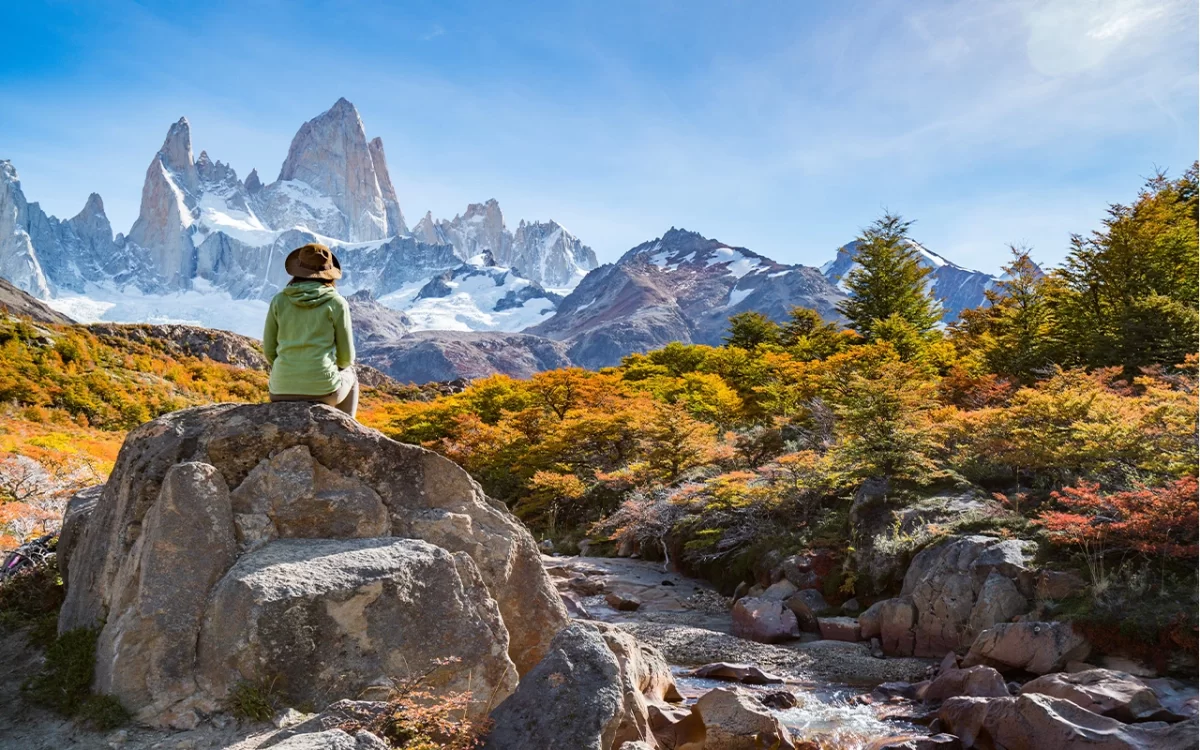
What is Ecotourism?
Ecotourism: Definition and History
For those looking to combine travel with environmental conservation and the well-being of local communities, ecotourism is an ideal type of travel. Also known as sustainable tourism, the definition of ecotourism can vary depending on the location and environment. In general, however, the main objective of ecotourism is to provide unforgettable travel experiences that educate visitors about local nature and cultural heritage with a minimal impact on surrounding ecosystems. It also focuses on supporting the local economy and community development.
This type of tourism emerged in the 1980s as a response to the adverse effects of mainstream tourism on the environment and local communities. Ecotourism programs and travel packages are designed to promote the conservation of natural resources and a better understanding of the intricate connections that comprise the local environment. The aim of ecotourism is long-term sustainability so that locals and tourists can continue to enjoy the beauty of these destinations for years to come.
Ecotourism organizers are focused on minimizing waste, conserving resources like energy and water, and reducing the carbon footprint of their operations. Ecotourist accommodations typically make efforts to source their linens, food, and beauty products from local, sustainable suppliers. Ecotourism programs are designed to provide education about conservation efforts and teach visitors to truly appreciate the local environment.
Countries struggling with economic growth, including Madagascar, Kenya, and Costa Rica, have benefited from implementing ecotourism programs. In 2019, the global ecotourism market generated $92.2 billion in profit. That number is projected to reach $103.8 billion by 2027.
Core Principles of Ecotourism
Like any industry, the success of ecotourism depends on high-quality implementation and adherence to certain core principles. The following four principles are the core factors ecotourism operators should implement in all their programming and infrastructure to achieve the best results for local communities and visitors.
1. Conservation
This is the most important part of ecotourism because it focuses on the long-term sustainability of local ecosystems. When tourists invest in nature-focused ecotourism companies, their money goes to research and development for conservation. Ecotourism can also encourage revenue-generating alternatives to communities that would otherwise turn to urban development, deforestation, or unsustainable agriculture practices.
2. Community
Ecotourism operators typically choose to employ members of nearby communities and use locally-sourced products in an effort to support the local economy and fight against poverty. Bolstering the local economy also benefits tourism operators by improving the surrounding environment to attract more visitors. Focusing on community initiatives is a great way to foster better connections between visitors and locals, encourage education about cultural diversity and heritage, and increase appreciation for the natural ecosystems that sustain local communities.
3. Education
Promoting a greater understanding of and appreciation for nature starts with education. Ecotourism should encourage programs that raise awareness and sensitize visitors to local environmental issues while encouraging them to be mindful and conscious of their impact while traveling. Ecotourism operators can educate visitors by employing naturalists, creating opportunities for immersive experiences in surrounding communities, and bringing in local guides and guest speakers to offer tours and lectures. inviting regular guest speakers. Some even extend their efforts to local schools and universities to ensure conservation becomes an integral part of society for visitors and locals.
4. Sustainable Development
A lot of waste is generated by mainstream tourism due to large-scale infrastructure development and the material use that comes with it. In response to this, ecotourism operators tend to orient all infrastructure around sustainability, from implementing solar panels and compost to sourcing all products locally. Tourists can expect locally sourced foods, recycled building materials, and other sustainable elements at an ecotourism facility.
The best ecotourism activities are both fun and fulfilling! Some popular ideas for sustainable tourism include hiking, camping, cycling, going on a eco-friendly safari, birdwatching, kayaking, or attending a wellness retreat. Other ecotourism companies might organize excursions to visit and learn about local communities, plan wilderness adventures, or offer volunteering opportunities with local farms or wildlife conservation programs.
Why Is Ecotourism Becoming Popular?
As sustainability gains momentum around the world, ecotourism is becoming increasingly popular. Although still smaller in scale, ecotourism is rapidly outpacing more traditional forms of tourism in terms of growth. Tourists are increasingly aware of the environmental impact of development and travel on local ecosystems, potentially devastating beloved natural landscapes. They seek ways to enjoy new experiences while minimizing their impact on local communities’ environment and cultural heritage. Part of this is greater access to information via the internet and social media , as well as more mainstream knowledge about the importance of protecting ecosystems against climate change and pollution.

Benefits of Ecotourism
Ecotourism can be profoundly beneficial for both tourists and the communities they visit. For tourists, ecotourism provides a unique and educational travel experience where they can connect to a destination through its nature and cultural heritage. For popular destinations, ecotourism supports local communities’ economies and promotes the conservation of natural resources. It promotes education on environmental issues and provides support for local conservation efforts.
Visitors are encouraged to learn about the local culture and to participate in cultural activities that are respectful and non-invasive. Ecotourism operators often partner with local communities to develop tourism activities that are culturally authentic and that provide economic benefits to the community. Ecotourism allows travelers to interact with new communities and understand their issues. This is invaluable education that children and adults can absorb and, hopefully, apply to their own lives and communities.
Well-managed ecotourism can help alleviate poverty by providing employment opportunities and options to develop sustainable industries. Communities with active ecotourism can put more resources and manpower into environmentally sustainable products and services rather than turning to development or other industries that degrade the environment.
Of course, the primary benefit of ecotourism is that it promotes sustainability and helps to protect surrounding ecosystems. It advocates for conservation and encourages ways to live more sustainably in a natural environment. Supporting well-developed ecotourism operations is a means of supporting ecologically sustainable growth.
Consequently, this can help to reduce carbon emissions and combat climate change. By tackling issues of pollution and waste from within the industry, ecotourism provides alternatives that are zero-carbon neutral and work towards reducing the impact of travel on the global climate.
Disadvantages of Ecotourism
However, if done incorrectly, ecotourism can have some adverse effects. As a quickly growing industry, it will be crucial for local governments and businesses to ensure that ecotourism operators are inspected and vetted. Well-run ecotourism facilities must be careful regarding their operations, or they might be greenwashing tourists into thinking their experience is environmentally friendly when the opposite is true.
When humans interact with wildlife or natural landscapes, damage or misunderstanding are risks. Therefore, ecotourism companies must benefit the environment instead of disrupting it. This requires well-trained employees and a deep understanding of business owners about the local environment and communities.
Ecotourism activities require new infrastructure to be built and will attract more people to an area that might not be accustomed to crowds. This has the potential to backfire. Ecotourism operators must ensure they are building responsibility and not displacing indigenous groups to make room for ecotourism expansion.
Tips for Ecotourists
To engage in ecotourism as responsibly and ethically as possible there are some guidelines and tips you can follow:
- Get prepared
Before undertaking an ecotourism travels, it’s a good idea to research the destination you have in mind, read reviews of ecotourism companies you’re interested in to make sure they are trustworthy, and learn about the activities that are available.
- Take only photos, leave only footprints
This is the golden rule for ecotourists. Leave the environment as you find it and practice environmental awareness.
- Be respectful of the wildlife
When interacting with native flora and fauna, be sure to follow the advice of your guides or the local authorities.
- Have an open mind
Be observant when visiting local communities and try to engage respectfully. Learning a few words in the local language or doing some research beforehand can go a long way.
- Keep things clean
Ecotourism companies go the extra mile to ensure you have a beautiful and ecological stay. Do your part by disposing of waste in the appropriate places and keeping track of your belongings, especially on day trips or outdoor excursions.

The Best Ecotourism Destinations
There are excellent examples of ecotourism destinations worldwide. Destinations range from tropical places where tourists might experience ancient forests and diverse wildlife to mountainous regions where they can learn about life in remote areas.
Tanzania is famous for its commitment to wildlife conservation and protecting natural areas. Ecotourism has become an essential part of the economy, accounting for 17.2% of the national GDP. The country has many national parks, including the Gombe National Park, home to protected chimpanzee habitats. The famous Ngorongoro Conservation area is an excellent example of ecotourism, with proceeds going to the local Maasai community.
Costa Rica is another well-known destination for ecotourism. With a wide variety of parks, animal sanctuaries, and wildlife reserves, Costa Rica has a well-developed ecotourism sector. Since it began its “Ecological Blue Flag” program to maintain strict ecological guidelines, it has seen vast improvements in the health of flora and fauna. Over ¼ of the land in Costa Rica is protected by the government for environmental purposes. Now, they welcome over 1.5 million tourists yearly to witness the stunning ecosystems that local efforts have fought to preserve.
Another great destination to experience ecotourism is New Zealand. Not only does ecotourism employ nearly 9% of New Zealanders, but it accounts for around 6% of its GDP. Eco-tourists can visit animal sanctuaries, witness glaciers, and volcanic areas, and explore maritime ecosystems. The oldest national park in New Zealand, Tongariro National Park, is one of only 28 UNESCO World Heritage sites chosen for cultural and natural reasons. Visitors can go there to learn about the native Maori tribes while getting a better understanding of the incredible ecosystems where they live.
Conclusion
Ecotourism, done well, should promote environmental conservation, cultural sensitivity, and community development. It should give travelers a unique and educational experience to connect with nature and learn about other communities while minimizing the negative impact on the environment and supporting the local economy. Choosing ecotourism can help to promote responsible travel and contribute to the conservation of our planet’s natural and cultural resources.









































































































































































































